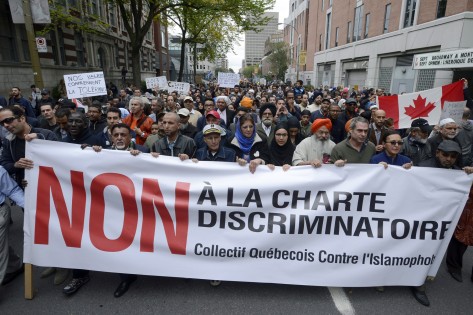
“No to the discrimatory charter” read the lead banner at the protest against Quebec’s proposed charter of values (THE CANADIAN PRESS/Ryan Remiorz)
By Pragash Pio
The governing Parti Quebecois (PQ) unveiled its ‘Quebec Charter of Values’, a thinly disguised attack on immigrants and religious minorities in Quebec. The most controversial sections prohibit public employees from wearing religious symbols on the job. The PQ, which advocates Quebec’ independence from Canada, isn’t a stranger to racism but the sheer hypocrisy and bigotry on display is stunning. The Charter’s guide forbids clothing like Islamic Veils, Jewish Kippas, Sikh Turbans, while allowing ‘small’ Crucifix necklaces and Star of David rings. Hypocritically, the PQ also doesn’t mention anything about removing the giant cross still hung in the Quebec National assembly or banning politicians from starting public meetings with Christian prayers. The PQ also conveniently ignores how much of the religious symbols and garb that they are proposing to ban, are mandatory to the respective communities while crucifixes are only an optional Christian practice.
Moreover, there is a conspicuous silence when it comes to the indigenous spiritual practices that Quebecois settler colonial society has been trampling on for centuries. The PQ justifies the Charter as essential to protecting the secular gains made in Quebecois national society by the Quiet Revolution.
The roots of the Quebec national movement are legitimate, arising from the discrimination of francophones (French Speakers) throughout Canada and Quebec. Decades of discrimination had left Quebec underdeveloped and most francophone workers living far below the poverty line. Those conditions faced by Quebecois led to the 1960’s Révolution Tranquille (Quiet Revolution). The Quiet Revolution was sparked by an asbestos miners strike against an exploitive American mining company in 1949, going on to create important material and social reforms that transformed Quebecois society: the creation of a public secular education system; the nationalization of Quebec’s electric grid; new publicly owned companies to develop local resources for Quebec’s economic advantage; labour rights for public and private sector workers; and the creation of a functioning welfare state in Quebec. Only after the Quiet Revolution and other popular social movements had accomplished unprecedented social and economic development in Quebec did political parties such as the provincial Parti Québécois (1971) and the federal Bloc Québécois (1991) emerge.
Quebec’s national struggle and Quiet Revolution were about improving the lives of the majority of Quebecers, such as its working class miners and students. This Charter of Values fiasco is really only about the PQ winning back votes, no matter how much it is couched in the nationalist language of Quebec’s Quiet Revolution. This PQ administration rode into power on the coattails of the historic student protests of 2012, but has since been steadily losing support for not delivering on any of students’ demands. The 2012 student protests were historic both in their scale and in their attempts to include all members of Quebec society in trying to resist austerity (the political push to cut government funding for services like education and health care and redirect money to profiteering corporations such as banks) and protect one of the real gains of the Quiet Revolution, the CEGEPS. The CEGEPS are low cost public colleges that many of Quebec’s working class rely on for higher education.
This Charter is a desperate nationalist ploy to restore some of the PQs support in rural areas at the expense of many working class immigrants and people of colour. Splits have already emerged in one of Quebec’s largest women’s organizations, and both labour and student unions have started coming down on opposing sides of the Charter. The Charter will also encourage the kind of racist anti-immigrant scapegoating and attacks that are on the rise.
Racism works against the building of ‘solidarity’ (the strategic combining of many people’s struggles against a common enemy) against the cuts to wages, workers rights, social services and programs. The 2012 Quebec Student Movement was intentionally built on broad solidarity and alliances, one of the pillars of its success and strength.
The real threats to the Quebecois national culture isn’t the hijab or turban, but the imperialist agenda for austerity imposed on all nations too small to independently resist. To marginalize veiled muslim women who wish to participate in Quebec’s economy rather than fighting the imperialist corporations and exploiters who wish to drain Quebec’s economy dry, that’s the true betrayal. Once again the Quebec Values Charter’ drama shows us the ugly results of handing over a national struggle to opportunistic politicians.
Comments
Pingback: Charte déloyale des valeurs? | 4 Years To Go